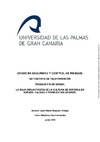Please use this identifier to cite or link to this item:
https://accedacris.ulpgc.es/jspui/handle/10553/68110
| DC Field | Value | Language |
|---|---|---|
| dc.contributor.advisor | Díaz Hernández, Maximino | - |
| dc.contributor.author | Requena Hidalgo, Juan Hilario | - |
| dc.date.accessioned | 2020-01-23T03:19:46Z | - |
| dc.date.available | 2017-07-31T00:00:00Z | es |
| dc.date.available | 2020-01-23T03:19:46Z | - |
| dc.date.issued | 2015 | en_US |
| dc.identifier.other | contentdm-postulpgc | es |
| dc.identifier.uri | https://accedacris.ulpgc.es/handle/10553/68110 | - |
| dc.description.abstract | La Cultura de Defensa es un término relativamente nuevo en España. Si bien, anteriormente se utilizaban conceptos como la Conciencia de Defensa o la Voluntad de Defensa, para expresar una misma realidad: el espíritu que necesita un pueblo para organizar su defensa y participar en la lucha por sus intereses (Laguna, 1996). Con este trabajo, se pretende realizar un análisis del origen y evolución de la Cultura de Defensa, teniendo en cuenta su enfoque actual, en el cual, el concepto Defensa se engloba en el de Seguridad. Asimismo, se estudiará su evolución, desde mediados de los años noventa, momento en que se identifica su aparición, hasta nuestros días; realizando una comparación con países del entorno. A continuación, el análisis se centrará en la situación actual, tomando como núcleo el Plan Director de Cultura de Defensa de 2002, con sus planes derivados e indicadores de efectividad, desde el momento de su implantación hasta el año 2015. Posteriormente, se identificarán los problemas detectados en cuanto a la realidad de la Cultura de Defensa en nuestra sociedad, enumerando las causas que han provocado su baja implantación. Por último, respecto a las conclusiones, se pretende resaltar los factores negativos que han motivado la realidad actual respecto de la Cultura de Defensa y nombrar las posibles alternativas y soluciones para hacer posible el cambio de tendencia actual. Para ello, se establecerán una serie de actuaciones a realizar por diversos actores gubernamentales, clasificadas en acciones a corto y largo plazo con el objetivo final de mejorar la situación de la cultura de Seguridad y Defensa en España. | en_US |
| dc.description.abstract | Culture of Defense is relatively a new term in Spain. While earlier concepts like Consciousness of Defense or the Will of Defense were used to express the same idea, the spirit that needs a nation to organize their defense and participate in the fight for their interests (Laguna, 1996) With this work is to perform an analysis of the origin and evolution of Culture of Defense, considering its current approach, in which the Defense concept in inside of Security factor. Also, it will be studied evolution since the midnineties, when its appearance was identified until nowadays; making a comparison with neighboring countries. The next step the analysis will focus on the current situation, taking as core the Director of Culture 2002 Defense Plan, with its derivative actions and indicators of effectiveness, from the time of implantation until 2014. Subsequently, it will identify the main concerns as to the reality of Culture Defense in our society, listing the causes which have led to its low implantation. Finally, as a conclusion, it will be highlighted the negative factors, which have caused the current situation and at the same time, it will look for the possible alternatives and solutions in order to change the current trend. Consequently, series of actions will be set to be performed by various governmental actors; including members of the Armed Forces. These actions will be classified as short- and long-term with the last goal of improving the situation of the culture of Security and Defense in Spain. | en_US |
| dc.format | es | |
| dc.language | spa | en_US |
| dc.rights | Acceso restringido para la comunidad universitaria de la ULPGC | es |
| dc.subject | 610901 Prevención de accidentes | en_US |
| dc.subject | 710302 Ética nacional | en_US |
| dc.title | La baja implantación de la cultura de defensa en España. Causas y posibles soluciones | en_US |
| dc.type | info:eu-repo/semantics/bachelorThesis | en_US |
| dc.type | BachelorThesis | en_US |
| dc.contributor.facultad | Estructura de Teleformación ULPGC | en_US |
| dc.identifier.absysnet | 735026 | es |
| dc.type2 | Trabajo final de grado | en_US |
| dc.description.notas | Grado en Seguridad y Control de Riesgos | en_US |
| dc.utils.revision | Sí | en_US |
| dc.identifier.matricula | TFT-36541 | es |
| dc.identifier.ulpgc | Sí | en_US |
| dc.contributor.buulpgc | BU-TEL | en_US |
| dc.contributor.titulacion | Grado en Seguridad y Control de Riesgos (No Presencial) | es |
| item.grantfulltext | restricted | - |
| item.fulltext | Con texto completo | - |
| crisitem.advisor.dept | Departamento de Enfermería | - |
| Appears in Collections: | Trabajo final de grado Restringido ULPGC | |
Page view(s)
128
checked on Mar 3, 2024
Download(s)
24
checked on Mar 3, 2024
Google ScholarTM
Check
Share
Export metadata
Items in accedaCRIS are protected by copyright, with all rights reserved, unless otherwise indicated.
